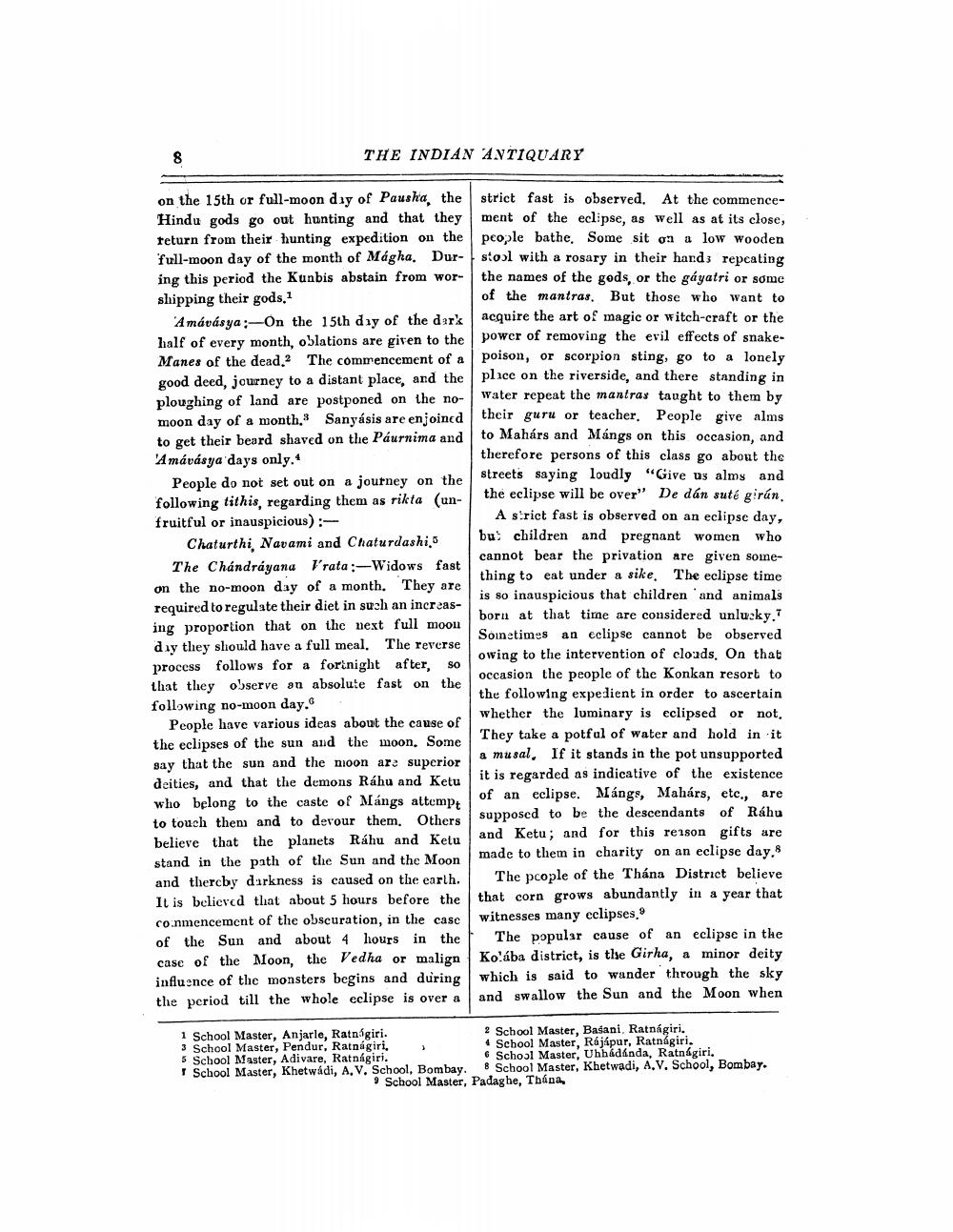________________
8
THE INDIAN ANTIQUARY
on the 15th or full-moon day of Pausha, the Hindu gods go out hunting and that they return from their hunting expedition on the full-moon day of the month of Mágha. During this period the Kunbis abstain from worshipping their gods.1
Amávásya:-On the 15th day of the dark half of every month, oblations are given to the Manes of the dead.2 The commencement of a good deed, journey to a distant place, and the ploughing of land are postponed on the nomoon day of a month. Sanyásis are enjoined to get their beard shaved on the Páurnima and 'Amávásya days only.
People do not set out on a journey on the following tithis, regarding them as rikta (unfruitful or inauspicious):--
Chaturthi, Navami and Chaturdashi The Chandrayana 'rata:-Widows fast on the no-moon day of a month. They are required to regulate their diet in such an increasing proportion that on the next full moon day they should have a full meal. The reverse process follows for a fortnight after, that they observe an absolute fast on the following no-moon day.
SO
People have various ideas about the cause of the eclipses of the sun and the moon. Some say that the sun and the moon are superior deities, and that the demons Ráhu and Ketu
who belong to the caste of Mángs attempt to touch them and to devour them. Others believe that the planets Ráhu and Ketu stand in the path of the Sun and the Moon and thereby darkness is caused on the earth. It is believed that about 5 hours before the conmencement of the obscuration, in the case of the Sun and about 4 hours in the case of the Moon, the Vedha or malign influence of the monsters begins and during the period till the whole eclipse is over a
1 School Master, Anjarle, Ratnagiri. 3 School Master, Pendur, Ratnagiri,
J
5 School Master, Adivare, Ratnagiri. School Master, Khetwádi, A. V. School, Bombay.
9 School Master,
strict fast is observed. At the commencement of the eclipse, as well as at its close, people bathe. Some sit on a low wooden stool with a rosary in their hands repeating the names of the gods, or the gáyatri or some of the mantras. But those who want to acquire the art of magic or witch-craft or the power of removing the evil effects of snakepoison, or scorpion sting, go to a lonely place on the riverside, and there standing in water repeat the mantras taught to them by their guru or teacher. People give alms to Mahárs and Mángs on this occasion, and therefore persons of this class go about the streets saying loudly "Give us alms and the eclipse will be over" De dán suté girún.
A strict fast is observed on an eclipse day, bu: children and pregnant women who cannot bear the privation are given something to eat under a sike. The eclipse time is so inauspicious that children and animals born at that time are considered unlucky.7 Sometimes an eclipse cannot be observed owing to the intervention of clouds. On that occasion the people of the Konkan resort to the following expedient in order to ascertain whether the luminary is eclipsed or not. They take a potful of water and hold in it a musal, If it stands in the pot unsupported it is regarded as indicative of the existence of an eclipse. Mángs, Mahárs, etc., are supposed to be the descendants of Ráhu and Ketu; and for this reason gifts are made to them in charity on an eclipse day,8
The pcople of the Thána District believe that corn grows abundantly in a year that witnesses many eclipses.
The popular cause of an eclipse in the Kolába district, is the Girha, a minor deity which is said to wander through the sky and swallow the Sun and the Moon when
2 School Master, Bašani, Ratnagiri.
4 School Master, Rájápur, Ratnagiri.
School Master, Uhhádánda, Ratnagiri.
8 School Master, Khetwadi, A.V. School, Bombay. Padaghe, Thána




